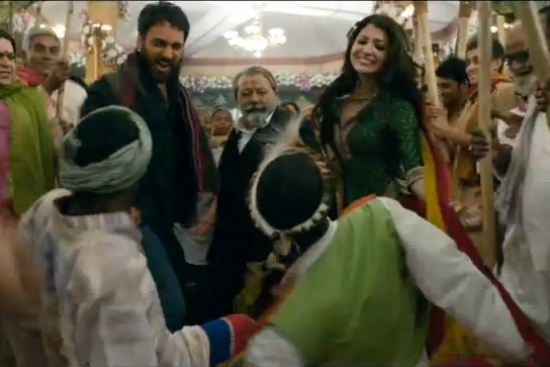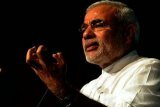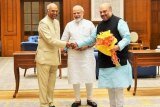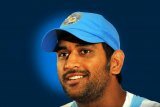Review: Imran Khan and Anushka Sharma's Matru Ki Bijlee Ka Mandola
Today, in the age of big-studio productions, it’s nearly impossible to make an angry film; not unless you're totally bonkers (though Dibaker Banerjee came close with Shanghai last year).

Clearly, Vishal Bharadwaj isn't. Inebriated, perhaps... And like Harry/Haria Mandola (Pankaj Kapur) there are flashes of brilliance in those drunken spells but equally, arrhythmic sequences of unmitigated boredom, which sabotage the potential Matru Ki Bijlee Ka Mandola holds.
More like this
For instance, take the opening scene. Harry and his chauffeur Matru/Hukum Singh (Imran Khan, someday this boy/man will learn to act) are standing outside a boarded up liquor stall in the middle of lush fields, demanding they be served a crate of Gulabo, the local brew the millionaire zamindar so loves. First, they blow up the stall by ramming their stretch limousine into it; then, cut-to-flashback to talk to the stall-owner in a long, semi-coherent drag, and then back again to the smashed stall and the coveted crate of booze. The ingredients are right, but there’s a slip somewhere between the idea, the writing and the enactment, so that what should have been a moment of utter lunacy is just a self-conscious set-up.
The feeling continues for a while before Bharadwaj manages to establish his characters––Mandola the schizophrenic landlord alternating between being a Commie messiah to the poor while drunk and a ruthless tyrant when sober, Matru, who has a double life of his own, Bijlee (Anushka Sharma), Mandola’s crazy-with-a-soft-core daughter who occasionally goes swimming in the local pond alongside buffaloes as the whole village watches on (why was this scene necessary?), Choudhary Devi (Shabana Azmi) the wily chief minister playing everyone in sight, her dimwit son Baadal (Arya Babbar) determined to marry Bijlee, and a band of villagers desperate to save their land from Mandola-Deviji, led by a mysterious presence called ‘Mao’ who drops pamphlets from the sky.
A satire on contemporary India, Matru Ki Bijlee Ka Mandola underscores the schism between rural privation and urban glitz separated by but a few miles, and the resultant schizophrenic nation. Drunk, Mandola is the ghost of India in the heady post-independence years which embraced socialism and lay proud claim to being an agrarian state. But the next morning he’s a ruthless entrepreneur out to make as much money as he can and denying the peasants their rights. Ruthless Choudhary and her ineffectual, sycophant bureaucrats, perpetually hung-over and unable to even pee straight, are metaphors for the state of governance in contemporary India. Mao is an invisible presence that can only be effective through insubordinate means while the masses despair for succour, either from a heavenly hand or an inexplicable change of heart in the powers that be.
Sometimes the subversive tactics pay off––such as potshots at the middling scions of political families embodied in Baadal who isn’t merely foolish, but dangerous too. He is the kind who goes to Africa and ‘buys’ an entire village to bring back to his fiancée because she likes their music. The exposition is occasionally loony––peasants dunking Baadal and his cohorts with dung bombs is ingenious, so is a drunken spin on a small plane in the dead of the night that goes wrong in the most hilarious fashion.
But then the film and the director start taking themselves seriously and its core falls apart. At one point Mandola steps out of character to make an ironic declaration of his scary vision for modern India––reminiscent of a crucial scene in JBDY where Tarenja (Pankaj Kapur again) and Commissioner D’Mello (Satish Shah) are going up a lift at a construction site transacting a deal to add illegal floors to the building and shaking hands over champagne against the setting sun. The difference between these two scenes is, the one in JBDY is consistently funny even in its darkest moments, while Matru can’t keep that tempo going.
Still, to talk of Mao and a socialist revolution in these times is outrageous enough to be deemed an act of courage. Or quasi-insanity, which isn't half bad if you can cope with the intermittent sluggishness and genre volte-face towards the end.
Deepa Deosthalee is a film critic and a regular contributor to Cinemascope column. The views and opinions expressed in this article are those of the author and does not reflect the views of IndiaNewsBulletin.com. More of Deepa's work can be found on her site Film Impressions.
Most read
- 2017: Full list of Indian States, capitals and their Chief Ministers; Nitish Kumar quits and takes oath again as Bihar CM!
- List of all the major rivers of India: Names, Origin and Length
- Ram Nath Kovind is 14th Indian President after Pranab Mukherjee. Here's a list of all Indian Presidents since 1950
- Indian cabinet September 2017: Full list of Ministers and their portfolios in Narendra Modi government
- Dosa recipe: How to make crispy Paper Dosa and Masala Dosa
- SIIMA 2016 Pics: South Indian Cinema stars dazzle in Singapore for the awards red carpet
- Commonwealth Games 2014: Full list of Indian gold, silver and bronze medal winners
- South Indian actress Trisha Krishnan’s father passes away
- Navrangi Navratri 2016: UK Indians revel in the traditional magic of garba and dandiya in London
- Review: Southall Travel (Also Travel Trolley and Fly Sharp)
India News Bulletin by email
More Lead Stories
- Pics: Salman Khan in London for his Global Diversity Award
- Osterley Gymkhana London hosts 70th Indian Independence Day Celebrations
- Indian tourists involved in fatal collision on M1 motorway involving minibus and 2 lorries
- 2017: Full list of Indian States, capitals and their Chief Ministers; Nitish Kumar quits and takes oath again as Bihar CM!
- Indian train meals not protected from rats, cockroaches, dust, insects, warn auditors












